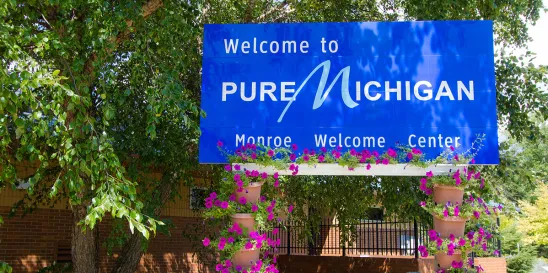Governor Gretchen Whitmer introduced Michigan’s Healthy Climate Plan in April 2022, boldly targeting 60% of the State’s power being derived from renewables by 2030, including a 50% renewable energy standard for utilities. However, Michigan’s renewable energy goals are no longer just ambition; they are now a reality with the recent passage of renewable-friendly legislation. The package of bills (SB 271, SB 273, SB 277, SB 502, SB 519) that have cleared the Legislature, and now await the Governor’s signature to become law, do several things to advance Michigan’s clean energy goals including:
- Set a 100% clean electricity standard by 2040
- Require utilities to get a certain percent of electricity from renewal energy sources (like wind and solar), including: 15% through 2029, 50% by 2030 and 60% by 2035
- Raise caps on distributed energy sources
- Set an energy storage standard of 2.5 Gigawatts by 2030
This package of bills, being called the “Clean Energy Future Plan,” represents a momentous change in Michigan’s energy law. With the Governor expected to sign these bills in the near future, Michigan will soon join other states committed to a 100% clean energy standard.
State Siting of Renewables in Michigan
In conjunction with the Clean Energy Future Bills, the Michigan Legislature also recently passed House Bill (HB) 5120 and HB 5121, two bills that would streamline the permitting process for renewable energy projects, making them easier to be built in Michigan. Specifically, these bills allow utility-scale wind, solar, and storage facilities to be approved by Michigan’s Public Service Commission (MPSC). Currently, local municipalities (often rural townships) are tasked with permitting utility-scale renewable energy projects in Michigan. Renewable energy developers have often been met with ardent opposition from local municipalities.
These new bills provide three key changes that will give developers a much needed reprieve from the permitting obstacles at the local level: (1) the MPSC will have authority over wind projects generating more than 100 megawatts, and solar and battery storage projects generating more than 50 megawatts (unless a local municipality adopts an ordinance that is not more restrictive than HB 5120’s mandates and timely approves compliant applications); (2) local municipalities will not be able to enact moratoria to stall renewable energy projects; and (3) Section 7 of HB 5121 (which is tie-barred to HB 5120) allows projects already approved by a municipality between 2021 and the Bill’s enactment to be a nonconforming use that is grandfathered in, so long as a developer has spent a certain amount of money on the project’s construction costs, or obtains “substantial construction.” This last development serves as a backstop for developers that have already put money into an approved project and a municipality seeks to subsequently amend its zoning ordinance.
Because HB 5120 explicitly contains an effective date, it will take effect one year from the Governor’s signature. Conversely, because HB 5121 has no explicit effective date, and has not been given immediate effect by a two-thirds vote of the Legislature, it will take effect 90 days after the Legislature adjourns sine die, which took place on November 14, 2023. As a result, HB 5121 should take effect around February 12, 2024.






 />i
/>i

